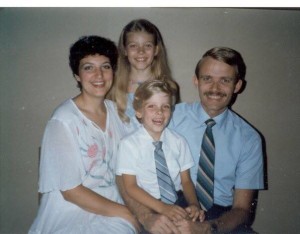It didn’t become a problem until second grade. Oh, it had always been there. I couldn’t figure out which hand to use, or how to hold a pencil. I read early, but I would read the same line over and over, unable to track down the page. Letters came out backwards, but I couldn’t see that they were wrong. I still can’t tell my right from my left unless you give me a minute to think about it (I resort to “my way” and “your way” when giving driving directions), and the lisp and stammer reappear when I’m really tired. If I stop talking to you in the middle of a sentence, it’s not because I’ve lost interest. It’s because I can’t find the word.
My first grade teacher saw it right away. Dyslexia. She told my parents, who took me in for tests and hooked me up with therapies that were supposed to pass as fun puzzles, but felt more like the visual equivalent of fingernails on a chalkboard. Total mental eyestrain with a side of aggravation.
But it wasn’t really a problem until second grade. In second grade, I failed a test, angry red check marks by every word. I had spelled each word correctly, but written the letters backward. In second grade, teachers started keeping me in at recess, to finish the schoolwork I couldn’t complete during class. I discovered that I was bad at math, that math meant shame and the loss of freedom and joy.
In the middle of second grade, my family moved to Liberia, and in some ways, that was my academic salvation. The second grade teacher at the mission school “happened to be” a special ed teacher in desperate need of a project, and I was a project in desperate need of a special ed teacher. She taped the alphabet to my desk, labeled everything “left” and “right,” made a divider so that I could work without distractions, and offered grace and extra time when I was overwhelmed. I don’t know what would have happened to me if it hadn’t been for Miss Barkey.
But it was still hard. I was smart, and always tested out in the ninetieth percentile (bubble answer sheets? Hello, beautiful!), but I didn’t get particularly good grades. Sometimes, I barely scraped by, if I scraped by at all. I made it through a year of college before dropping out, and that last semester was pretty dismal. I still don’t have a good explanation for why I struggled so much. I wasn’t lazy, or stupid, and I didn’t even have the reading problems that kids with dyslexia are supposed to have. In fact, reading was my strong suit. But struggle I did.
And struggle I do, even still. I have developed some mad coping skills, but remember those stereograms that were popular in the nineties, where you would squint at this dense, complex pattern until a 3D image popped out at you? Imagine that the whole world saw the 3D image every time they even glanced at it, but no matter how hard you squinted, you could never make it out. That is what dyslexia feels like to me.
That’s not where the story ends, of course. I went back to college in my thirties, graduated with honors, and am slogging through my M.Div. right now. My second book will come out in August, and my writing has won some pretty cool awards. I speak in front of people on a regular basis, and usually, I don’t stammer or lisp. Not bad for a girl who can’t tell her right hand from her left.
But I still have dyslexia, and I still struggle at times. You don’t want to know how many mistakes I have purged from this post, and heaven help me if I have to write something out by hand. When I was sending in the application to join my writer’s guild, I went through three envelopes before I finally managed to write the address correctly. I always worry that people will think I am a snob for not offering to take notes at meetings. Believe me, friends. You don’t want me taking notes. And yes, I see a complex, super-sized pattern comprised of a thousand far-flung elements where most people seem to see one clear image. My brain can be an overwhelming place at times, words and ideas swarming like bees, buzzing just beyond my reach. It is easier to immerse myself in someone else’s words and ideas than deal with the abstract nature of my own.
So, why am I sharing this? I dunno. Maybe it’s because studying Greek reminds me of how absolute miserable it was for me to learn how to write. Maybe it’s because I see kids who are struggling in school, and I want to remind myself and anyone else who happens to be listening that that is not the be-all, end-all. Maybe it’s because it’s finals week, and I’m always overtired and angsty during finals week. Who knows. But maybe, this post will bring someone a little comfort and encouragement, and then it will be worth any self-indulgent angst that was involved in its production.
What about you? Do you or someone you know struggle with dyslexia or a similar issue? Tell me about it!


9 Responses to I’m a writer with dyslexia. And no, it’s not a joke.